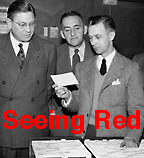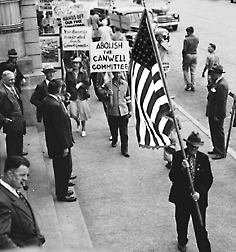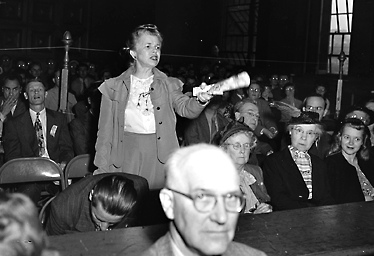

The hearings were held on the second floor of the armory, now the Center House of Seattle Center. English Professor Joseph Harrison later described the scene: "Six or seven men sit behind a high table, the man in the center armed with a gavel. Below them, facing a witness, sits the chief inquisitor. Behind him sit two or three rows of members of the faculty. Beyond them sit 91 spectators, all that can crowd into the small chamber."
The five days of hearings followed a format used in other investigations. Ex-Communists on the national scene were brought in to give "expert" testimony on the nature of the Communist Party, which was portrayed as unlike other American political parties. Party leaders, the witnesses said, expected strict adherence to positions handed down from Moscow and advocated the overthrow of the U.S. government by force and violence. Local ex-Communists followed the "experts" to the stand and reported seeing professors at meetings of the Communist Party.

In the end only 11 professors actually testified although, curiously, Canwell also used the hearings to make accusations against some people who had no affiliation with the University. Burton and Florence James, for example, had taught at the UW in the past but at the time of the hearings had their own theater company which performed in what is now the Playhouse Theatre on the Ave. Both were accused by witnesses of being members of the Communist Party.
The professors who testified had mixed reactions to the questions. English Professor Sophus Winther said he had been a member of the party for a year and named colleagues who had been in meetings with him. English Professors Maude Beal, Angelo Pellegrini, Harold Eby and Garland Ethel, and Anthropology Professor Melville Jacobs admitted past party membership but would not name anyone else. Rader and Sociology Professor Joseph Cohen denied ever being members of the party. Phillips, Butterworth and Gundlach refused to answer the questions at all.
Gundlach stated the basis for the trio's refusal most clearly, saying--when asked if he was a member of the Communist Party: "No legislative committee has the right to ask about one's personal beliefs and associations." Unfortunately, the courts of the time disagreed with him. When witnesses in a similar hearing challenged this right in 1947, the U.S. Supreme Court refused to hear the case, thus sustaining two lower court rulings that investigative committees did not violate the First Amendment by asking suspected Communists about their political activities.
Knowing they had court support, the committee demanded a response of "yes" or "no" to the question of Communist Party membership. Those who refused to answer were cited for contempt, and sometimes treated with contempt. When Ethel refused to name associates in the party, he quoted Polonius' speech to his son in Hamlet, "To thine own self be true." He then explained, "Now that happens to be my situation; I have a standard of honor, and that standard is not to name other persons, and I told you that would be my position." Thereafter, Ethel was referred to as "Professor Polonius."
Canwell made a great show of allowing all those testifying to have attorneys present, but the attorneys were hamstrung. They were not permitted to raise any objections to the proceedings, to cross-examine witnesses who had accused their clients or to offer evidence in their clients' behalf. When they tried to speak, Canwell banged his gavel and interrupted, as in this comment addressed to Phillips' attorney John Caughlan:
"We are not going to debate the issue of the legality of this committee or its processes. That may be done elsewhere; and at present, you will be confined to the instructions given, and from here on in we will expect you to comply precisely with those instructions."
When Caughlan responded by asking a question, Canwell said, "You will ask no more questions. We are not going to go on with any ridiculous procedure here. You will either comply with the instructions of the committee or you will be removed . . . ."

This was no idle threat. State Patrol officers were posted at the hearings, and on Canwell's orders, they ejected anyone who spoke out. He also dispatched the officers outside the armory when protesters calling "Canwell must go!" were heard in the hearing room.
It must have been difficult for the accused professors to listen to testimony about their alleged activities and not be able to reply. Florence James at one point became so angry that she stood up and shouted at the committee, whereupon she was "escorted" out of the room by State Patrol officers. Rader managed to keep his composure when one of the "expert" witnesses said he had seen the professor at a Communist school in New York during a summer Rader knew he had spent in Washington state. He decided to save his anger and seek a legal remedy later.
The Firings: Three Professors Sacked, Three Others Put on
Probation
The Aftermath: Banned from
Academe
The Apology: "A Dark Day in Our History"
Says UW President
Red Alert: Lectures, Exhibits and
a Play about the Canwell Hearing
Reader Reaction to "Seeing Red": Was It "Superb" Reporting or "Trash"?
Online Primary Sources of the Canwell Committee Hearings